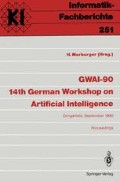Zusammenfassung
Unter Berücksichtigung einiger bekannter Modellierungsansätze wird ein universelles Akteur-Modell formuliert, welches auf Absichten, Ressourcen und Verhalten von Akteuren basiert. Aus diesem Modell wird eine Systemarchitektur entwickelt und diese, soweit bereits spezifiziert bzw. implementiert, dargestellt. Ferner werden offene Fragen angesprochen, die mit dieser Architektur untersucht werden sollen. Die in diesem Beitrag gewählten Beispiele entstammen einer Anwendung für verkehrssichernde und -optimierende Systeme.
Access this chapter
Tax calculation will be finalised at checkout
Purchases are for personal use only
Preview
Unable to display preview. Download preview PDF.
Literatur
M. Benda (Hrsg.): “Proc. Ninth Workshop on Distributed Artificial Intelligence“, ohne Verlag, 1989
A. H. Bond: “Commitment: Some DAI Insights from Symbolic Interactionist Sociology“, in /Be/ pp. 239–262
A. H. Bond, L. Gasser (Hrsg.): “Readings in Distributed Artificial Intelligence“, Morgan Kaufmann, 1988
M. E. Bratman: “Intentions, plans, and practical reasoning“, Harvard Univ. Press, 1987
M. E. Bratman, D. J. Israel, M. E. Pollack: “Plans and resource-bounded practical reasoning“, Comput.Intel 1. 4 (1988) 349–355
P. R. Cohen, H. J. Levesque: “Persistence, Intention, and Commitment“, SRI Technical Note 415, 1987
P. R. Cohen, C. R. Perrault: “Elements of a Plan-Based Theory of Speech Acts“, Cognitive Sci. 3 (1979)
M. Evans, J. Anderson: “A Constraint-Based Architecture for Multi-Agent Problem Solving“, in /Be/ pp. 1–24
M. S. Fox: “An Organizational View on Distributed Systems“, IEEE Trans.Systems Man and Cybern. SMC-11 (1981) 70–81
L. Gasser, C. Braganza, N. Herman: “MACE: A Flexible Testbed for Distributed AI Research“, in /Hu/ pp. 119–152
L. Gasser, M. Huhns (Hrsg.): “Distributed Artificial Intelligence Vol. II“, Morgan Kaufmann und Pitman, 1989
M. P. George ff, A. L. Lansky (Hrsg.): “Reasoning about Actions and Plans“, Morgan Kaufmann, 1987
B. Hayes-Roth, M. Hewett, R. Washington, R. Hewett, A. Seiver: “Distributing Intelligence within an Individual“, in /GH/ pp. 385–412
C. Hewitt: “Viewing Control Structures as Patterns of Passing Messages“, Artif.Intell. 8 (1987) 323- 363
M. N. Huhns (Hrsg.): “Distributed Artificial Intelligence“, Pitman & Morgan Kaufmann, 1987
T. Ishida: “CoCo: A Multi-Agent System for Concurrent and Cooperative Operation Tasks“, in /Be/ pp. 197–213
A. L. Lansky: “Behavioral Specification and Planning for Multiagent Domains“, Techn. Note 360, SRI International, Menlo Park, CA, 1985
T. W. Malone: “Organizing Information Processing Systems: Parallels between Organizations and Computer Systems“, in: W. Zachary, S. Robertson, J. Black (Hrsg.) Cognition, Computation, and Cooperation, Ablex Publ. Corp., 1989
D. McArthur, R. Steeb, S. Cammarata:- “A Framework for Distributed Problem Solving“, Proc. AAAI- 82, 181–184
J. S. Rosenschein: “Synchronization of Multi-Agent Plans“, Proc. AAAI-82, 115–119
J. S. Rosenschein: “Rational Interactions: Cooperation Among Intelligent Agents“, PhD thesis, Stanford Univ., 1985
C. J. Stuart: “An Implementation of a Multi-Agent Plan Synchronizer“, Proc. IJCAI-85, 1031–1033
/TM/ M.T.Tennenholtz, Y.M.Moses: “On Cooperation in a Multi-Entity Model“, Proc. IJCAI-89, 918–923
E. Werner: “Cooperating Agents: A Unified Theory of Communication and Social Structure“, in /GH/ pp. 3–36
Author information
Authors and Affiliations
Editor information
Editors and Affiliations
Rights and permissions
Copyright information
© 1990 Springer-Verlag Berlin Heidelberg
About this paper
Cite this paper
Sundermeyer, K. (1990). Modellierung von Szenarien Kooperierender Akteure. In: Marburger, H. (eds) GWAI-90 14th German Workshop on Artificial Intelligence. Informatik-Fachberichte, vol 251. Springer, Berlin, Heidelberg. https://doi.org/10.1007/978-3-642-76071-6_2
Download citation
DOI: https://doi.org/10.1007/978-3-642-76071-6_2
Publisher Name: Springer, Berlin, Heidelberg
Print ISBN: 978-3-540-53132-6
Online ISBN: 978-3-642-76071-6
eBook Packages: Springer Book Archive

